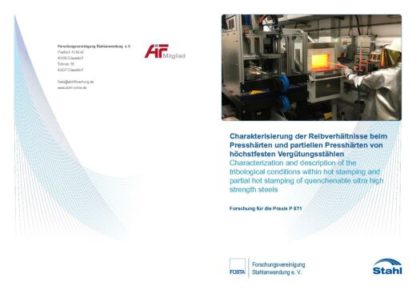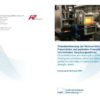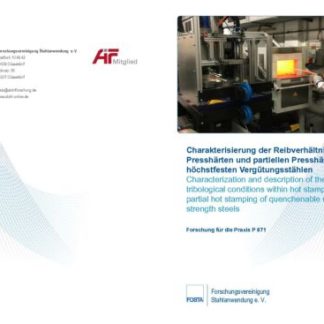Description
P 871 – Characterization and description of the tribo-logical conditions within hot stamping and partial hot stamping of quenchenable ultra high strength Steels
Due to the increasing importance of lightweight construction hot stamping has been established in the production of safety relevant components out of high strength steel. In order to enable an accurate process design of hot stamping processes by using finite-element-simulation (FE) a detailed knowledge of the prevailing tribological conditions is necessary. In this research project an experimental test rig was developed and built in order to analyze the frictional behavior in hot stamping processes.
The aim of the project was to characterize the tribological conditions for direct and partial hot stamping processes. The gained results were used for the development and the implementation of a time- and spatial dependent friction model in commercially used finite-element-software. For this purpose a strip drawing test rig for the determination of friction coefficients at elevated temperatures was designed, built and started up. A heatable slide for the transportation of the warm metal strip ensures that the frictional behaviour can be investigated under close-to-process conditions. The friction coef-ficient is measured by the normal force at the friction jaw and the tension force at the metal strip. The relation between the friction coefficient and the process parameters tool and workpiece temperature as well as contact pressure and relative velocity have been investigated with strip drawing experiments. It has been shown that an increase of these process parameters leads to decreased friction coefficients for AlSi-coated blanks. Rising contact pressures and relative velocities result in reduced friction for blanks with Zn coating, whereas higher temperatures cause increased friction. Based on the experimental results a friction model has been developed and implemented into the FE-Software AutoForm. The developed friction model has further been verified using a cup drawing geometry. In the future, the friction model shall be rated by the involved industry partners with the geometry of a serial component. The simulation of processes in hot forming and in particular partial hot stamping is clearly improved by the enhanced friction model. Thus, the extremely cost and time intensive process design including tool adjustment is accelerated especially for SMEs. Furthermore, a target-oriented development of materials and coatings concerning tribological conditions by steel producers is possible.
The research project was carried out at Lehrstuhl für Fertigungstechnologie, Friedrich-Alexander-Universität Erlangen-Nürnberg. FOSTA has accompanied funded the research project work.
Only available in german language.
Authors:
M. Merklein, M. Rosenschon, P. Schwingenschlögl
Published in:
2018




